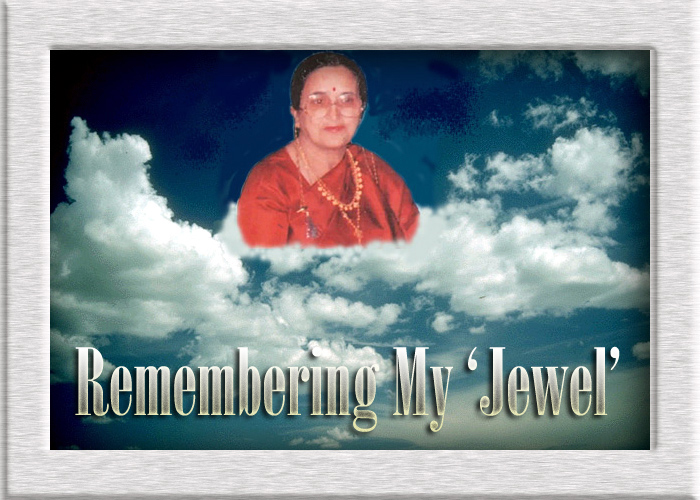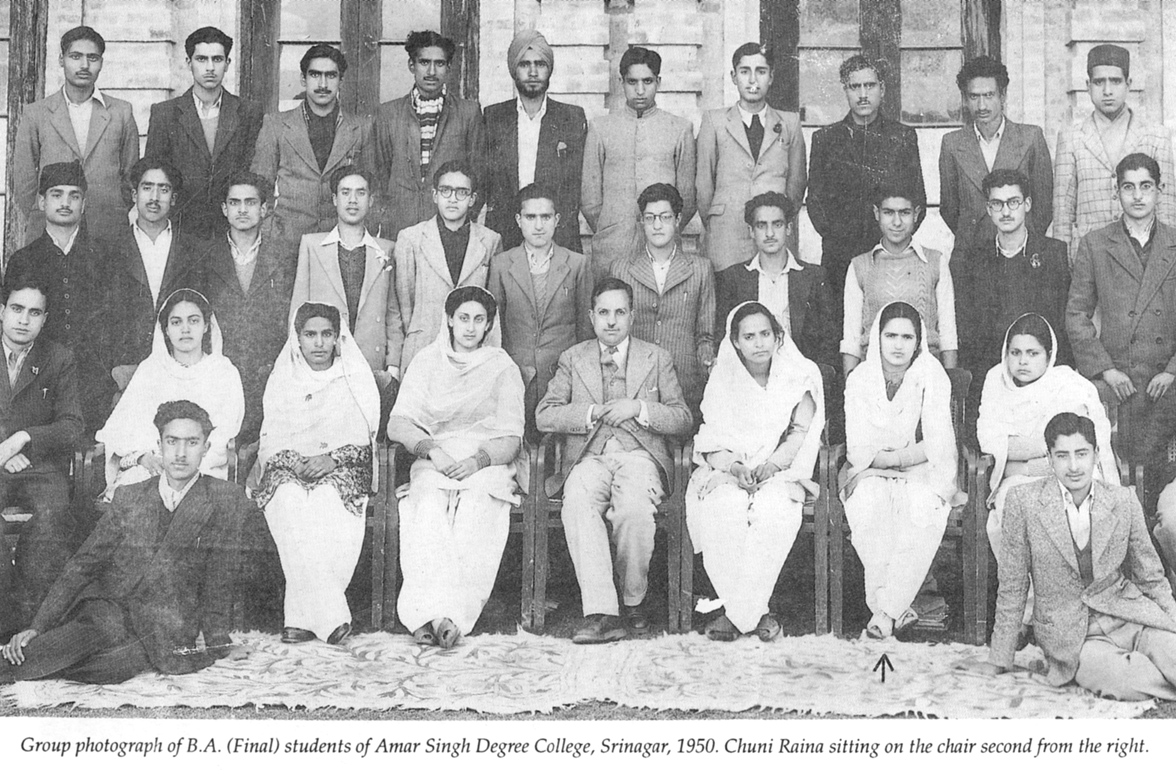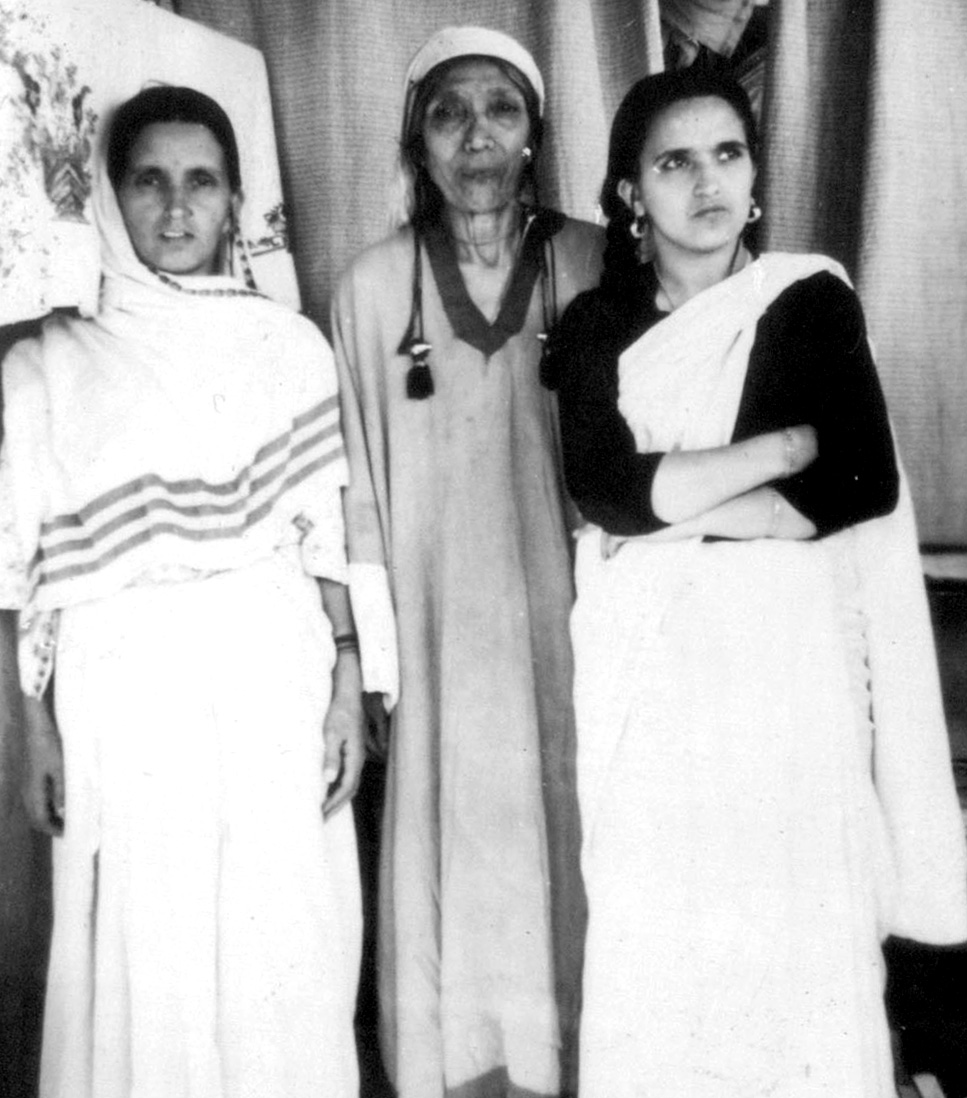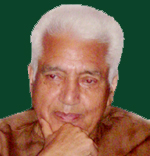Remembering my 'Jewel'
 |
 |
|
It was the dark, dreary night of first of November last year in Delhi. I was awake, while the world around was asleep. Calm and tranquility prevailed; the atmosphere was serene, somber and sanguine. In a philosophic reverie, I strongly felt that while all life, sentient or insentient, grows and matures, yet it falls and fades and perhaps is finally forgotten even.
In a jiffy, as it were, a flashback appeared on my memory screen of what had happened on the same date exactly sixty-seven years earlier on November 1, 1947 on a similar cold wintry day in Srinagar, the capital city of India’s northern State of Jammu & Kashmir. It was the auspicious day when I had got tied in nuptial knot to a beautiful, chubby, 18-year-old college-going girl. Her name was Chuni, which in our native language means ‘Jewel’. Our wedding bells tolled at a time when tribal invasion on Kashmir from across the border had assumed ugly proportions. The Indian army was fighting the invaders barely four to five miles away from the venue where the auspicious marriage ceremony was being performed. Nuptial mantras were being chanted amid the sound and fury of the exchange of gunfire between the Indian troops and the Pakistani invading forces. Romance on the Battle-front Since the invaders had plunged the war-torn city of Srinagar into complete darkness by snapping the supply of electricity from its source, the main Power House at Mohra, we had to spend our first-ever night together under candlelight in which we were hardly able to recognize each other’s faces. Yet, the night was blissful inasmuch as it transformed our solitude into unforgettable moments of bliss and filled the recesses of our hearts with lots of love and ineffable joy.  For the newly-weds like us, it was a romance on the battlefront. There was no honey nor any moon, for the night belonged to the dark half of the lunar month of Kartika when moon rises in the sky for an insignificantly brief period. Of course, one could not think of going anywhere for honeymoon in the then prevailing political situation when the two newly independent States of India and Pakistan were locked in an armed conflict following the uncalled for tribal invasion on Kashmir ordered by Mohammed Ali Jinnah. For the newly-weds like us, it was a romance on the battlefront. There was no honey nor any moon, for the night belonged to the dark half of the lunar month of Kartika when moon rises in the sky for an insignificantly brief period. Of course, one could not think of going anywhere for honeymoon in the then prevailing political situation when the two newly independent States of India and Pakistan were locked in an armed conflict following the uncalled for tribal invasion on Kashmir ordered by Mohammed Ali Jinnah. Within two weeks of our wedding, however, I left Srinagar for Delhi to seek work, now that I was a family man. Thanks to Dr/ Balwant Singh, the well-known surgeon of those days in Kashmir, I was able to avail of a free passage to Delhi in one of the Indian Air Force planes returning to the Indian capital after bringing in military reinforcements for ground troops engaged in war with Pakistan on the soil of Kashmir. Dr. Balwant Singh could arrange it as he happened to be a close relations of the then Defense Minister of India, Baldev Singh. I was excited, of course, for it was my first-ever travel of my life by air. I had to go alone as my better half had to complete her four-year Bachelor’s course first in Sri Pratap college and then in Amar Singh Degree College, Srinagar.(1946-50) Chuni finally joins me It was in December 1950, a little more than three years after wedding, that my dear wife, Chuni, finally joined me in Shimla where I was working in the Monitoring Services of All India Radio. The only link between us during this long period of separation was provided by the exchange of love letters, hers outnumbering those of mine. I had a lot to tell her about myself, good, bad and indifferent. Knowing too well that she possessed a serene and sober temperament, I blurted out more than was perhaps necessary. But, the way she reacted to my occasional failings revealed the breadth of her mind and the nobility of her spirit. Her magnanimity overawed me. I soon realized that her beauty was not limited to the long silky hair that had infatuated me when I had seen her for the first time three years back, but it lay in the virtue and purity that surrounded it. I cursed the dark night of our first meeting after marriage that had hidden from my eyes not only the chiseled contours of her beautiful physical frame, but also the intensity of her love and sincerity of her heart. Suave and Unassuming  Chuni Raina was no leader, no orator, no writer or a career woman. She was but a good soul, noble and gentle. A woman of few words, suave and unassuming, Chuni was quite affectionate, genial and friendly. The sweetness of the soft words that usually trickled down from her gentle lips was music to the listener. One could not encounter a more warm and kind-hearted person. She did not bear any malice toward anyone, including her detractors. She always wore a benign, winsome and magical smile on her face. No one would go away without being touched by the innocence of her soul. Chuni Raina was no leader, no orator, no writer or a career woman. She was but a good soul, noble and gentle. A woman of few words, suave and unassuming, Chuni was quite affectionate, genial and friendly. The sweetness of the soft words that usually trickled down from her gentle lips was music to the listener. One could not encounter a more warm and kind-hearted person. She did not bear any malice toward anyone, including her detractors. She always wore a benign, winsome and magical smile on her face. No one would go away without being touched by the innocence of her soul.While she possessed a sophisticated temperament (she would in normal course change three times a day), a dignified and graceful demeanor, she was so simple, so polite and so humble. With an eye for the elegant and the beautiful, she was fond of good dresses. She had a marked weakness for sarees. Purse permitting, she would often go in for new varieties and fabrics available in the market. She had a passion for cleanliness and could not stand any sort of dirt, whether of body or mind. Meticulous to the core, she abhorred lethargy. A strong believer in action, she planned her activities well in advance. In personal dealings, she was upright and honest. A great lover of nature, of trees, plants and flowers, roses in particular, she would be seen watering the plants in her backyard even in failing health during the last few months of her life. Orthodox and deeply religious, she took great interest in the study of scriptures-the Bhagwad-Gita, the Ramayana and the Mahabharata. Swami Vivekananda's writings made a great impact on her thinking. The advent of the saint of Shirdi in our lives in 1962 gave her a new meaning and purpose. She started keeping fasts on Thursdays which continued almost till the end of her earthly journey. Strong Aesthetic Sense Imbued with a strong aesthetic sense, she was extremely sensitive to good music, both light and classical. Among the contemporary vocalists, the late Kumar Gandharva claimed her greatest attention. All work would stand still when the famed musician would be on audio or video. She would avidly listen to good film based and other music, ghazals and bhajans. Meaningful lyrics like those of Kavi Pradeep would send her into ecstatic mood. Besides Saigal, Lata, Geeta Dutt, Asha Bhonsle, Mukesh, Rafi and Kishore, she took intense delight in listening to Jagjit Singh, Talat, Hemant Kumar and Reshma. The songs of Meera and Kabir, couplets of the sage-poetess of Kashmir, Lal Ded, and of sufi poets and saints, Sai bhajans, the musical rendering of Ramcharitmanas and the hymns of Sikh Gurus formed almost a regular part of her food for soul. Marital Life Her quiet nature and sober temperament, that had inspired awe and respect for her at college, rendered our married life very happy and blissful. Both of us cared a lot for each other. Not that we would not differ, rarely though. Mutual understanding, accommodation and adoration characterized our relationship. She never swerved an inch from what I said and wanted; she never allowed suspicion to make a dent in our relationship. Implicit trust in me was her watchword.  A pious, cultured and a gentle soul, she was an epitome of fortitude and forbearance. Her philosophic composure, wise counsel and calm and cool disposition invariably proved a source of strength and inspiration to me in the hour of strain and stress. A pious, cultured and a gentle soul, she was an epitome of fortitude and forbearance. Her philosophic composure, wise counsel and calm and cool disposition invariably proved a source of strength and inspiration to me in the hour of strain and stress.Being one of the few educated women of her time, she wanted to pursue a teaching career, but preferred to be a house-wife and a dedicated mother. To be fair to her, by taking this decision she, in fact, respected my view at that time that a woman need not take up a job at the cost of welfare of children and family. She bore five children, three sons and two daughters, though in her heart of hearts she wanted equal number of sons and daughters. She raised them in a disciplined manner and saw to it that they grew and matured on right lines. She took a personal interest in their studies and their general welfare. Her eldest son, who has retained her maiden surname Ganju, is the editor of Shehjar. Untimely Death Alas! I lost that Jewel to the dreaded disease, cancer, on 16th of August, 1995, when she had just turned 67, thus bringing to an end nearly 48 years of unbroken marital relationship, marked by mutual love, appreciation, cordiality, confidence and trust. Her untimely death broke my heart and affected my poise. Without her I really felt lonely and lost. I literally gave myself up to dismay and despair and for days together after she shed her mortal coil, I would retire to my room, ruminate and quietly shed a tear or two. Every morning, I would take a sheet of paper and stare at it throughout the day with a brief interval for lunch. So vacant was my mind that when evenings would come, the sheet of paper would still be blank. And this state of affairs continued for nearly two months before I penned down the agony and anguish of my grieving heart in an open letter in her name. About five years later, the poet in my grandson, Nihar, gave my feelings a poetic expression when he wrote his first-ever sonnet on Time: “Why did you have to leave me stranded here? Her Parting Gift “The Moving Finger writes, and having Writ, True, one cannot cancel even one-fourth of a line already written by the Moving Finger! Kahlil Gibran too was right when he said, “Life is eternal and love is immortal and Death is only a horizon, and a horizon is nothing, save the limit of our sight.” Chuni, my dearest, my jewel, |
|
|
 *A journalist by profession, a scholar by temperament and a writer by choice, Gopinath Raina was inclined to study of religion from very young age. It was Vivekananda’s dynamic exposition of Hindu thought that fired his imagination while he was still at school. By the time he entered college, he had been drawn to the writings of Gandhi, Aurobindo, Narayana Guru, Radhakrishnan and Bertrand Russell. *A journalist by profession, a scholar by temperament and a writer by choice, Gopinath Raina was inclined to study of religion from very young age. It was Vivekananda’s dynamic exposition of Hindu thought that fired his imagination while he was still at school. By the time he entered college, he had been drawn to the writings of Gandhi, Aurobindo, Narayana Guru, Radhakrishnan and Bertrand Russell.
After retiring from Indian Information Service in 1983 after completing 35 years as an editor and a correspondent in All India Radio, he edited AICC Journal, Varnika, (Jan.'84-Dec.'90), Koshur Samachar (March '91-Oct '95), Sanatana Sandesh,(1997-2005) and KASHEER (2003-2004), He has since been writing on various aspects of Hindu thought, particularly on saints and sages. Presently he lives in Miami spending his time writing personal memoirs. |
|
|